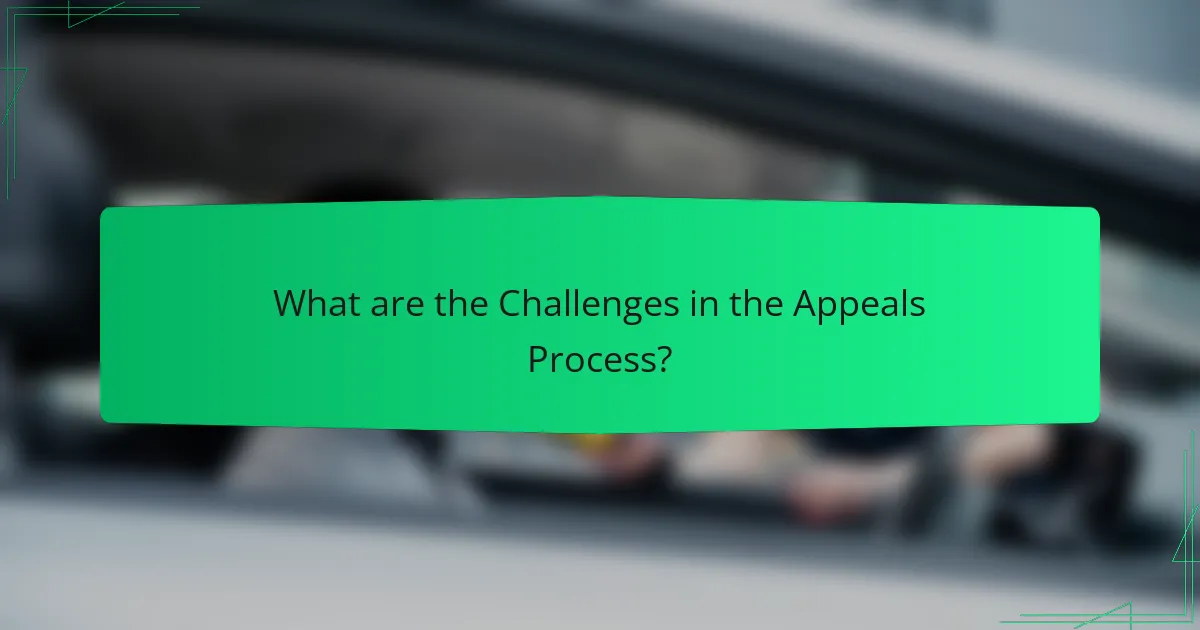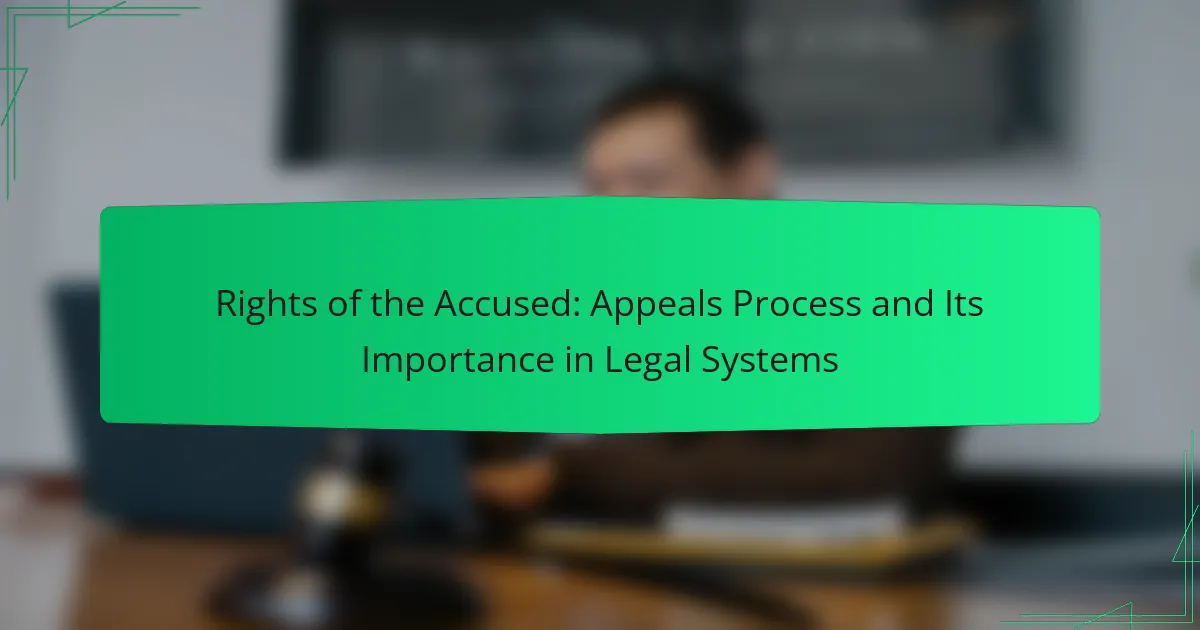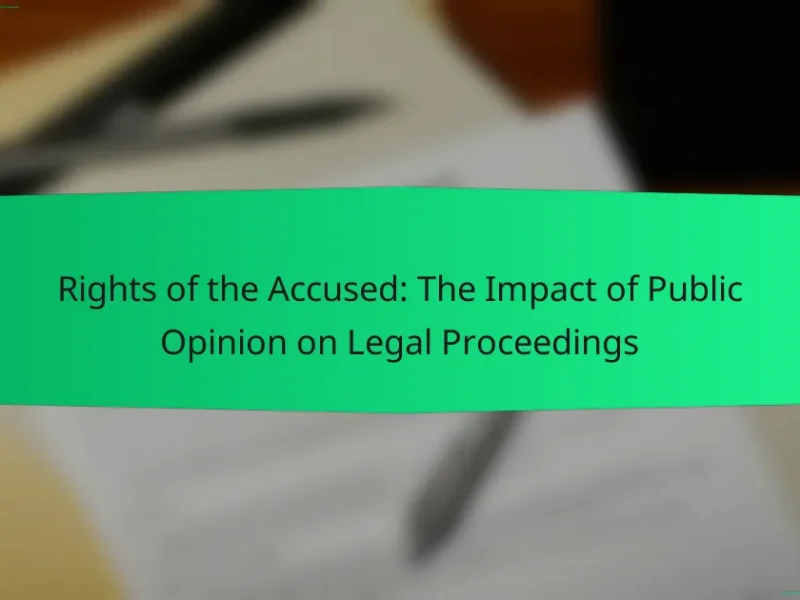The article focuses on the rights of the accused within legal systems, emphasizing the fundamental protections such as the right to a fair trial, legal representation, and the right to remain silent. These rights are critical for ensuring just treatment of individuals facing criminal charges, as they facilitate impartial hearings and the opportunity to defend oneself. The article also examines the appeals process, which allows parties to challenge court decisions based on legal errors, highlighting its significance in correcting potential miscarriages of justice. Additionally, it addresses the challenges individuals encounter during the appeals process, including complex legal standards, limited access to resources, and procedural barriers that can hinder their ability to seek justice effectively.

What are the Rights of the Accused in Legal Systems?
The rights of the accused in legal systems include the right to a fair trial, the right to legal representation, and the right to remain silent. These rights ensure that individuals facing criminal charges are treated justly. The right to a fair trial guarantees an impartial jury and a public hearing. Legal representation allows the accused to have an attorney defend them. The right to remain silent protects against self-incrimination. Additionally, the accused has the right to be informed of the charges against them. They also have the right to confront witnesses and present evidence in their defense. These rights are essential in upholding justice and preventing wrongful convictions.
How do these rights protect individuals during legal proceedings?
These rights protect individuals during legal proceedings by ensuring fair treatment and due process. They guarantee the right to legal representation, allowing defendants to present their case effectively. Additionally, these rights include the presumption of innocence, which prevents wrongful convictions. The right to a public trial ensures transparency and accountability in the legal process. Furthermore, individuals have the right to confront witnesses, enabling them to challenge evidence presented against them. These protections are crucial for maintaining justice and preventing abuses of power within the legal system.
What specific rights are guaranteed to the accused?
The specific rights guaranteed to the accused include the right to a fair trial, the right to remain silent, and the right to legal counsel. The right to a fair trial ensures that the accused is judged impartially by a jury of peers. The right to remain silent protects the accused from self-incrimination during questioning. The right to legal counsel guarantees that the accused has access to an attorney for guidance and representation. These rights are enshrined in the Sixth Amendment of the U.S. Constitution and are fundamental to ensuring justice in legal proceedings.
How do these rights vary across different jurisdictions?
The rights of the accused vary significantly across different jurisdictions. In the United States, defendants have the right to a fair trial, legal representation, and the presumption of innocence. In contrast, some countries may not guarantee these rights to the same extent. For instance, in certain authoritarian regimes, due process may be limited, and trials can be expedited without proper legal representation. Additionally, the appeals process can differ; in some jurisdictions, defendants may have multiple levels of appeal, while others may restrict this to a single appeal. Cultural, legal, and historical factors influence these variations. For example, common law systems often emphasize individual rights more than civil law systems, which may prioritize state interests.
Why are the Rights of the Accused crucial for justice?
The Rights of the Accused are crucial for justice because they ensure fair treatment during legal proceedings. These rights protect individuals from wrongful conviction and abuse of power. They include the right to remain silent, the right to an attorney, and the right to a fair trial. These protections help maintain public confidence in the legal system. Historical cases, such as Gideon v. Wainwright, highlight the importance of legal representation. This case established the right to counsel for defendants who cannot afford an attorney. Additionally, the presumption of innocence is a foundational principle of justice. It ensures that the burden of proof lies with the prosecution. Without these rights, the risk of miscarriages of justice increases significantly.
How do these rights prevent wrongful convictions?
Rights of the accused prevent wrongful convictions by ensuring fair legal representation and due process. These rights include the right to an attorney, the right to a fair trial, and the right to appeal. Access to legal counsel allows defendants to present a robust defense. This minimizes the risk of errors during trial proceedings. The right to a fair trial ensures impartiality and adherence to legal standards. It protects against biases that could lead to wrongful convictions. The appeals process allows for the review of potential errors in the original trial. Studies indicate that wrongful convictions often arise from inadequate legal representation. According to the Innocence Project, over 70% of wrongful convictions involve serious mistakes made by defense attorneys. Therefore, these rights are crucial in safeguarding against wrongful convictions.
What role do these rights play in maintaining public confidence in the legal system?
These rights play a crucial role in maintaining public confidence in the legal system. They ensure that individuals are treated fairly and justly during legal proceedings. When accused individuals have rights, it promotes transparency and accountability. This transparency reassures the public that the legal system operates without bias. Furthermore, the protection of these rights helps prevent wrongful convictions. Studies show that legal systems that uphold these rights tend to have higher public trust. For example, a survey by the American Bar Association indicated that 75% of respondents believe that protecting the rights of the accused is essential for a fair justice system. Thus, these rights are fundamental to fostering trust in legal institutions.

What is the Appeals Process in Legal Systems?
The appeals process in legal systems allows a party to challenge a court’s decision. This process typically involves submitting a request to a higher court for review. The higher court examines the lower court’s record for errors in law or procedure. If errors are found, the higher court may reverse or modify the decision. Appeals are generally limited to legal arguments and do not involve new evidence. Most legal systems have specific rules governing the time frame and format for filing an appeal. For example, in the United States, the Federal Rules of Appellate Procedure outline these requirements. The appeals process is crucial for ensuring justice and correcting potential miscarriages of justice.
How does the appeals process function?
The appeals process allows a higher court to review the decision of a lower court. It begins when a party files a notice of appeal after a trial or ruling. The appellant must provide grounds for the appeal, usually citing legal errors. The appellate court reviews the case record and may allow oral arguments. The judges then deliberate and issue a written decision. This decision can affirm, reverse, or modify the lower court’s ruling. The appeals process ensures legal standards are upheld and provides a check on judicial decisions. It is a critical component of due process in legal systems.
What are the steps involved in filing an appeal?
The steps involved in filing an appeal typically include several key actions. First, the appellant must review the trial court’s decision and grounds for appeal. Next, the appellant prepares a notice of appeal, which must be filed with the appropriate court. This notice usually outlines the specific rulings being challenged. After filing the notice, the appellant must compile the record on appeal, which includes trial transcripts and relevant documents. Subsequently, the appellant drafts an appellate brief that presents legal arguments and supporting evidence. The opposing party then has the opportunity to respond with their own brief. Finally, the appellate court reviews the submitted materials and may hold oral arguments before making a decision. These steps ensure a structured process for challenging a legal decision.
What types of appeals can be made?
The types of appeals that can be made include direct appeals, collateral appeals, and interlocutory appeals. Direct appeals challenge the final judgment of a trial court. They typically address legal errors that occurred during the trial. Collateral appeals, also known as post-conviction relief, challenge the legality of a conviction after the direct appeal has been exhausted. Interlocutory appeals occur during the trial process, addressing specific rulings made by the court before the trial concludes. Each type serves a distinct purpose in ensuring the rights of the accused are protected within the legal system.
Why is the appeals process important for the accused?
The appeals process is important for the accused because it provides a mechanism to challenge wrongful convictions. This process allows the accused to seek a review of their case by a higher court. It serves as a safeguard against judicial errors or unfair trials. The appeals process can lead to the overturning of unjust sentences. According to the Innocence Project, DNA evidence has exonerated over 375 individuals in the U.S., highlighting the importance of appeals. Furthermore, the appeals process ensures that legal standards are upheld. It promotes accountability within the justice system. Ultimately, it protects the rights of the accused by allowing for reconsideration of evidence and legal arguments.
How does the appeals process serve as a check on judicial decisions?
The appeals process serves as a check on judicial decisions by allowing higher courts to review and potentially overturn lower court rulings. This process ensures that legal errors can be corrected, maintaining the integrity of the judicial system. Appellate courts examine the application of law and adherence to legal standards. They assess whether the trial court made mistakes that affected the outcome. This oversight prevents arbitrary or unjust decisions from standing. The appeals process also promotes consistency in legal interpretations across cases. By doing so, it safeguards the rights of the accused and upholds public confidence in the legal system.
What impact does the appeals process have on the rights of the accused?
The appeals process significantly enhances the rights of the accused. It provides a mechanism for challenging wrongful convictions or unfair sentences. This process allows for the review of legal errors that may have occurred during the trial. It ensures that the accused has the opportunity to present new evidence or arguments. The appeals process can lead to the overturning of unjust decisions. According to the National Registry of Exonerations, many wrongful convictions are corrected through appeals. This highlights the importance of the appeals process in safeguarding justice. Overall, the appeals process serves as a critical check on the legal system.

What are the Challenges in the Appeals Process?
The challenges in the appeals process include complex legal standards and procedural requirements. These complexities can create barriers for individuals seeking to appeal a decision. Limited access to legal resources often hinders the ability to navigate the appeals process effectively. Time constraints can also impact the quality of the appeal. Additionally, the burden of proof generally rests on the appellant, which can be difficult to meet. Many appeals are dismissed due to technical errors or missed deadlines. The emotional toll of prolonged legal battles can further complicate the situation. Finally, the lack of uniformity in appeal procedures across jurisdictions can create confusion and inconsistency.
What common obstacles do accused individuals face during appeals?
Accused individuals face several common obstacles during appeals. One major obstacle is the complexity of legal procedures. Appeals often require a deep understanding of legal standards and rules. Many accused individuals lack the legal knowledge needed to navigate this process effectively. Additionally, time constraints can hinder their ability to prepare a strong case. Most jurisdictions impose strict deadlines for filing appeal documents. Financial limitations also present a significant barrier. Legal representation can be costly, and many accused individuals may not afford it. Furthermore, limited access to legal resources can impede their ability to gather necessary evidence. This lack of resources often results in weaker appeals. Finally, the burden of proof typically remains on the appellant. They must demonstrate that errors occurred during the original trial that affected the outcome. This requirement can be difficult to meet without solid legal support.
How does access to legal representation affect the appeals process?
Access to legal representation significantly enhances the appeals process. Legal representation ensures that defendants receive expert guidance on legal standards and procedural requirements. With an attorney, individuals can better identify potential grounds for appeal. Representation also improves the quality of arguments presented to appellate courts. Studies show that represented defendants have higher success rates in appeals compared to unrepresented ones. For instance, a report by the National Center for State Courts indicates that attorneys increase the likelihood of reversing convictions. Overall, access to legal representation is crucial for a fair and effective appeals process.
What role do time constraints play in the effectiveness of appeals?
Time constraints significantly impact the effectiveness of appeals in legal systems. They limit the duration available for preparing and presenting arguments. This can lead to rushed or incomplete submissions. Research shows that tight deadlines can reduce the quality of legal arguments. A study by the National Center for State Courts found that appeals filed under strict time limits often result in lower success rates. Additionally, time constraints can hinder thorough investigation and evidence gathering. This further diminishes the chances of overturning a decision. Hence, the role of time constraints is crucial in determining the outcome of appeals.
How can the appeals process be improved for better outcomes?
The appeals process can be improved by increasing transparency and accessibility. Clear guidelines and procedures should be established to help individuals understand their rights. Providing legal assistance at the outset can also enhance the process. Timely communication regarding case status is essential for all parties involved. Additionally, implementing standardized training for appellate judges can ensure consistency in rulings. Research indicates that jurisdictions with streamlined processes see higher satisfaction rates among defendants. According to the National Center for State Courts, jurisdictions that prioritize clarity and support in their appeals process report better outcomes for all stakeholders.
What best practices can enhance the efficiency of the appeals process?
Implementing standardized procedures can enhance the efficiency of the appeals process. Standardization reduces variability and ensures consistency in handling cases. Establishing clear timelines for each stage of the appeal promotes timely resolutions. Utilizing technology for case management streamlines document handling and communication. Training personnel on best practices improves overall competency and effectiveness. Regularly reviewing and updating procedures keeps the process aligned with current legal standards. Collaboration between legal entities fosters a unified approach to appeals. These practices collectively contribute to a more efficient appeals process, ensuring that the rights of the accused are upheld.
How can legal systems ensure fair treatment of the accused during appeals?
Legal systems can ensure fair treatment of the accused during appeals by implementing standardized procedures and guidelines. These procedures should guarantee access to legal representation for the accused. Ensuring that legal counsel is available helps safeguard the rights of individuals. Additionally, courts should provide transparent processes for submitting evidence and arguments. This transparency allows for fair consideration of the appeal. Furthermore, appellate courts must be composed of impartial judges. Impartiality is crucial in making unbiased decisions. Finally, legal systems should establish clear timelines for appeals to prevent unnecessary delays. Timely resolutions contribute to the overall fairness of the process.
What are the key takeaways for understanding the rights of the accused and the appeals process?
The rights of the accused include the presumption of innocence and the right to legal representation. These rights are fundamental to ensuring a fair trial. The appeals process allows the accused to challenge a conviction or sentence. It serves as a safeguard against judicial errors. The accused can appeal based on legal mistakes or new evidence. Appeals are typically reviewed by higher courts. Statistically, a significant percentage of appeals result in overturned convictions. Understanding these rights and processes is crucial for protecting individual freedoms within legal systems.
The primary entity of the article is the “Rights of the Accused” within legal systems, focusing on the appeals process and its significance. The article outlines essential rights such as the right to a fair trial, legal representation, and the right to remain silent, emphasizing their role in ensuring justice and preventing wrongful convictions. It also details the appeals process, including its function, types, and the challenges faced by the accused, while highlighting the importance of access to legal representation and the impact of time constraints on appeal effectiveness. Key takeaways underscore the necessity of these rights and processes in maintaining public confidence in the legal system and safeguarding individual freedoms.


